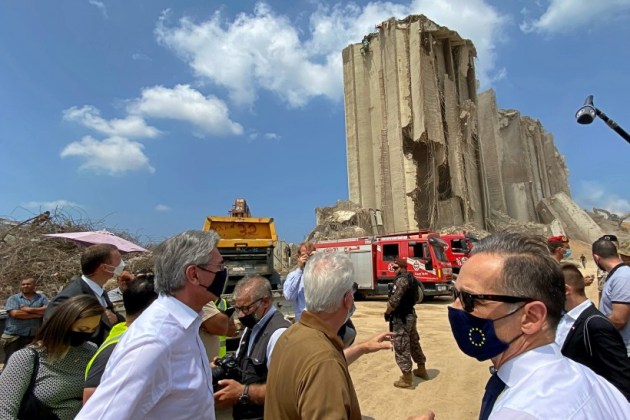Aftermath of deadly blast in Beirut
A nation still burying its dead on Tuesday marked a week since the explosion in Beirut that flattened much of the Lebanese capital's port, damaged buildings and left thousands of people dead and injured.
 1 / 7
1 / 7A nation still burying its dead on Tuesday marked a week since the explosion in Beirut that flattened much of the Lebanese capital’s port, damaged buildings and left thousands of people dead and injured. In pic: German Foreign Minister Heiko Maas wears a protective mask as he views the damage at the site of a massive explosion at Beirut port. (Reuters)
You’ve Read Your Free Stories For NowSign up and keep reading more stories that matter to you.Already have an account? Sign InThis story requires a subscriptionSelect a plan and use IE10 code to get 10% extra offAlready a subscriber? Sign inThis story requires a subscriptionSelect a plan and use IE10 code to get 10% extra offThis content is exclusive for our subscribers.Subscribe now to get unlimited access to The Indian Express exclusive and premium stories.Already a subscriber? Sign In- 2 / 7
The explosion was caused by the ignition of 2,750 tons of ammonium nitrate that had been sitting at Beirut port for more than six years. (Reuters)
- 3 / 7
Sister of Corporal Gerges Deabes, who died as the result of Tuesday's blast in Beirut's port area, gestures during his funeral in Klayaa, Lebanon. (REUTERS)
- 4 / 7
The explosion has fuelled popular outrage against the country’s top political leaders and security agencies, and led to the resignation of the government on Monday. (Reuters)
- 5 / 7
In the wake of the disaster, documents have come to light that show that top Lebanese officials knew about the existence of the stockpile in the heart of Beirut near residential areas, and did nothing about it. (Reuters)
- 6 / 7
The explosion, which obliterated the capital’s port, damaged thousands of apartments and offices in the capital and came on top of an unprecedented economic and financial crisis the country the country has been mired in since late last year, compounding the nation’s collective distress. (Reuters)
- 7 / 7
Lebanese have demanded an independent Cabinet not backed by any of the political political parties they blame for the mess they are in. In pic: A team from the German Federal Agency for Technical Relief, assist Lebanese engineers in assessing building structure safety of Sursock Museum. (Reuters)